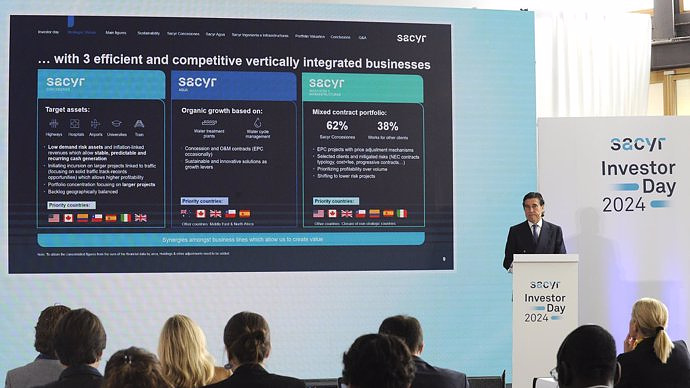The auditors point out that Spain did not fully meet one of the 52 milestones of its application to the Recovery and Resilience Mechanism
MADRID, 13 Oct. (EUROPA PRESS) -
The European Court of Auditors has warned that the overall level of errors in spending under the EU budget increased in the 2021 financial year to 3%, compared to the level of 2.7% recorded in 2020, which has led auditors to issue an unfavorable opinion on EU spending in 2021.
"As in the last two years, the auditors conclude that the level of error of high-risk spending was widespread and have issued an unfavorable opinion on EU spending in 2021," says the Court.
Almost 63.2% of audited spending was considered high risk, an increase from 59% in 2020 and compared to previous years. High-risk spending recorded material errors at an estimated percentage of 4.7% for 2021, up from 4% in 2020.
The estimated level of error is not an indicator of fraud, inefficiency or waste, but rather an estimate of funds that were not used fully in accordance with EU and national rules.
However, during their examination, the auditors also detected fifteen cases of suspected fraud, up from six in 2020.
In 2021, the total budget expenditure of the EU amounted to €181.5 billion, the equivalent of 2.4% of the total expenditure of the public administrations of the EU Member States and 1.3% of their gross national income.
Taking into account Recovery and Resilience Facility spending, total EU payments in 2021 amounted to €228 billion. About three quarters of them are spent under shared management, under which Member States distribute funds, select projects and manage EU spending.
The auditors annually audit the EU's income and expenditure and examine whether the annual accounts are reliable, and whether the income and expenditure operations are in accordance with the applicable regulations.
An "adverse" opinion means that the auditors have found widespread problems. To deliver their opinion, the auditors check samples of transactions to enable them to obtain statistical estimates of the degree to which expenditure from the EU budget is affected by error. They measure the estimated level of error for this expense against a 2% threshold, above which irregular expenses are considered significant.
This year, the audit covered for the first time the Recovery and Resilience Mechanism, the main component of the European Recovery Instrument (NextGenerationEU), with a value of 800,000 million euros, aimed at mitigating the economic consequences of the pandemic.
In 2021, only one payment from the Recovery and Resilience Mechanism was made, the one corresponding to Spain, the Court notes, adding that "the auditors found that one of the 52 milestones included in Spain's payment request had not been fully met", although it did not consider the consequent impact to be significant.
However, the auditors found weaknesses in the Commission's assessment of milestones and call for improvements in future such assessments.
They also note that compliance with other national and EU rules is not part of the Commission's assessment of the legality and regularity of payments under the Mechanism and is therefore not analyzed in their opinion.
In addition, the effectiveness of the different reforms covered by the milestones could preferably be covered in future specific special reports.

 Exploring Cardano: Inner Workings and Advantages of this Cryptocurrency
Exploring Cardano: Inner Workings and Advantages of this Cryptocurrency Seville.- Economy.- Innova.- STSA inaugurates its new painting and sealing hangar in San Pablo, for 18 million
Seville.- Economy.- Innova.- STSA inaugurates its new painting and sealing hangar in San Pablo, for 18 million Innova.- More than 300 volunteers join the Andalucía Compromiso Digital network in one month to facilitate access to ICT
Innova.- More than 300 volunteers join the Andalucía Compromiso Digital network in one month to facilitate access to ICT Innova.-AMP.- Ayesa acquires 51% of Sadiel, which will create new technological engineering products and expand markets
Innova.-AMP.- Ayesa acquires 51% of Sadiel, which will create new technological engineering products and expand markets Death toll rises to 107 from floods caused by heavy rains in southern Brazil
Death toll rises to 107 from floods caused by heavy rains in southern Brazil BBVA is willing to assume the possible reputational risk if the takeover bid for Sabadell does not go ahead
BBVA is willing to assume the possible reputational risk if the takeover bid for Sabadell does not go ahead Takeda earns 54% less at the end of its year and announces a restructuring plan
Takeda earns 54% less at the end of its year and announces a restructuring plan The Ibex 35 stands out from Europe and falls 0.92% affected by the collapse of BBVA after the takeover bid for Sabadell
The Ibex 35 stands out from Europe and falls 0.92% affected by the collapse of BBVA after the takeover bid for Sabadell How Blockchain in being used to shape the future
How Blockchain in being used to shape the future Not just BTC and ETH: Here Are Some More Interesting Coins Worth Focusing on
Not just BTC and ETH: Here Are Some More Interesting Coins Worth Focusing on Expociència expects to receive more than 4,000 visitors in the Science Park of the University of Valencia
Expociència expects to receive more than 4,000 visitors in the Science Park of the University of Valencia They develop devices for the precise diagnosis of cancer patients
They develop devices for the precise diagnosis of cancer patients UMH researchers are working on a high-quality apricot crop that requires less irrigation water
UMH researchers are working on a high-quality apricot crop that requires less irrigation water The UPV develops an application to improve the quality of life of patients with glioblastoma
The UPV develops an application to improve the quality of life of patients with glioblastoma A million people demonstrate in France against Macron's pension reform
A million people demonstrate in France against Macron's pension reform Russia launches several missiles against "critical infrastructure" in the city of Zaporizhia
Russia launches several missiles against "critical infrastructure" in the city of Zaporizhia A "procession" remembers the dead of the Calabria shipwreck as bodies continue to wash up on the shore
A "procession" remembers the dead of the Calabria shipwreck as bodies continue to wash up on the shore Prison sentences handed down for three prominent Hong Kong pro-democracy activists
Prison sentences handed down for three prominent Hong Kong pro-democracy activists ETH continues to leave trading platforms, Ethereum balance on exchanges lowest in 3 years
ETH continues to leave trading platforms, Ethereum balance on exchanges lowest in 3 years Investors invest $450 million in Consensys, Ethereum incubator now valued at $7 billion
Investors invest $450 million in Consensys, Ethereum incubator now valued at $7 billion Alchemy Integrates Ethereum L2 Product Starknet to Enhance Web3 Scalability at a Price 100x Lower Than L1 Fees
Alchemy Integrates Ethereum L2 Product Starknet to Enhance Web3 Scalability at a Price 100x Lower Than L1 Fees Mining Report: Bitcoin's Electricity Consumption Declines by 25% in Q1 2022
Mining Report: Bitcoin's Electricity Consumption Declines by 25% in Q1 2022 Oil-to-Bitcoin Mining Firm Crusoe Energy Systems Raised $505 Million
Oil-to-Bitcoin Mining Firm Crusoe Energy Systems Raised $505 Million Microbt reveals the latest Bitcoin mining rigs -- Machines produce up to 126 TH/s with custom 5nm chip design
Microbt reveals the latest Bitcoin mining rigs -- Machines produce up to 126 TH/s with custom 5nm chip design Bitcoin's Mining Difficulty Hits a Lifetime High, With More Than 90% of BTC Supply Issued
Bitcoin's Mining Difficulty Hits a Lifetime High, With More Than 90% of BTC Supply Issued The Biggest Movers are Near, EOS, and RUNE during Friday's Selloff
The Biggest Movers are Near, EOS, and RUNE during Friday's Selloff Global Markets Spooked by a Hawkish Fed and Covid, Stocks and Crypto Gain After Musk Buys Twitter
Global Markets Spooked by a Hawkish Fed and Covid, Stocks and Crypto Gain After Musk Buys Twitter Bitso to offset carbon emissions from the Trading Platform's ERC20, ETH, and BTC Transactions
Bitso to offset carbon emissions from the Trading Platform's ERC20, ETH, and BTC Transactions Draftkings Announces 2022 College Hoops NFT Selection for March Madness
Draftkings Announces 2022 College Hoops NFT Selection for March Madness




























